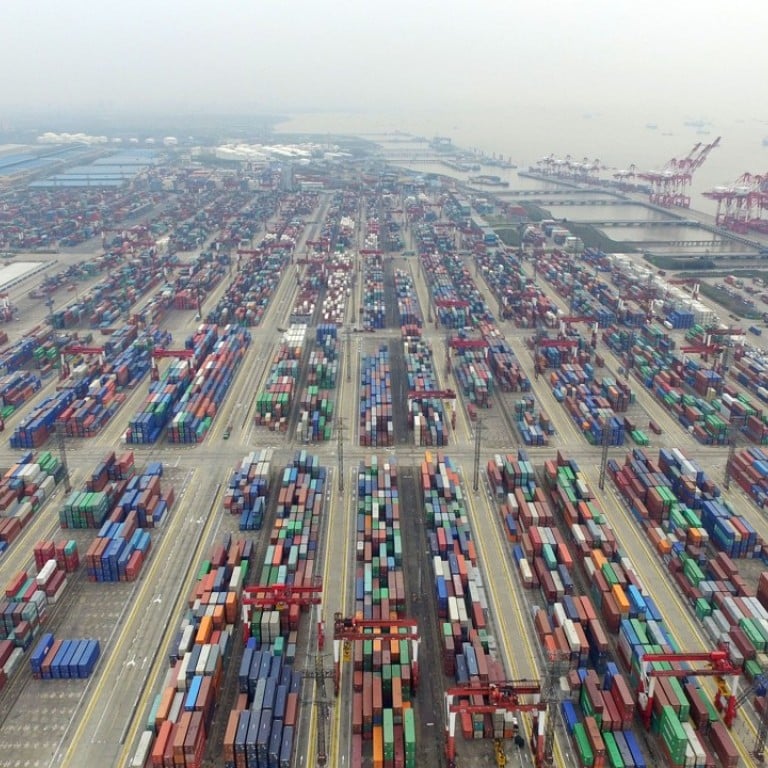
Exclusive | Like a ‘dog with a bone on trade,’ Trump won’t back down until US deficit narrows, Reince Priebus says
US President Donald Trump is mulling a so-called reciprocal tax on imports to help America narrow its US$375 billion trade deficit with China, and he won’t back off until the imbalance “moves in the right direction,” his former chief of staff told the South China Morning Post.
US President Donald Trump, poised to add an estimated US$60 billion tariff package on Chinese products this week, is mulling a so-called reciprocal tax on imports to help America narrow its US$375 billion trade deficit with China, and he won’t back off until the imbalance “moves in the right direction,” said his former chief of staff.
“I don’t think the president is looking for a trade war, but he won’t back down from an issue he’s been talking about, and believed in, for 40 years,” said former White House Chief of Staff Reince Priebus, in an interview with the South China Morning Post at the Credit Suisse Asian Investment Conference in Hong Kong. “This is a signature issue that he’s not going to let go of. He’s like a dog with a bone on this trade issue.”
China’s government this week backed down from forcing foreign manufacturers to transfer their technology to local partners for market access, a practise that Beijing doesn’t acknowledge exists, even though foreign companies in automotive, semiconductor and new-energy batteries had been complaining about it for years.
China will also open up industries including aged care, education and financial services to overseas investments, remove foreign equity ceilings in some areas, while gradually cutting market access restrictions, Li said, without indicating when these changes would happen.
“Certainly, tech transfer and intellectual property are at the forefront of the issues that the [US] Trade Representative is looking at to determine how far we have to go to start the correction,” Priebus said. “First and foremost on the president’s agenda is the issue of trade imbalance.”
To defuse the trade row, Chinese President Xi Jinping dispatched two senior officials over two months from the Communist Party’s most powerful decision-making body, the Politburo, to the US.
“The US is likely to address its main beef with Beijing - the lack of equal and reciprocal access for US businesses selling their goods and services in China - instead of cutting off those Chinese exports that are sought after by American consumers,” said John Woods, the Asia-Pacific chief investment officer of Credit Suisse, in Hong Kong. “Expect China to grant greater access to selected markets for US companies, set in place agencies and monitoring systems to increase protection of US intellectual property rights, and further step up commitments to buy more US-made goods to reduce the trade deficit somewhat.”
However, both the February visit by China’s top diplomat Yang Jiechi, and the visit earlier this month by vice-premier Liu He, failed to yield results. The US imposed a 25 per cent tariff on steel and 10 per cent levy on aluminium on March 2.
“As I understand it, there has been a lot of talk, but not a lot of action,” said Priebus, who was chairman of the Republican Party for six years before joining the Trump White House as chief of staff in 2017, a job he held for six months until the president fired him with a tweet. “So the president decided to take things into his own hands and said, ‘We’ll do something about steel and aluminium. The next thing we’ll do is on technology and intellectual property rights.’ That’s how we got to where we are today.”

The origins of Trump’s reciprocal tax idea, which he referred to in offhand remarks on February 12 during a White House event on infrastructure, are unclear. Reciprocity exists in US personal income tax, particularly between Midwest and East Coast states where large sections of the workforce live and work across state boundaries. Reciprocity agreements between states exempt workers from paying taxes twice.
“The whole idea of a reciprocal tax is fairness,” Priebus said. “Trade fairness is what he cares about the most. If you tax our motorbikes at 25 per cent, we will tax your motorbikes at 25 per cent. That’s generally what the president’s view is.”
Trump didn’t elaborate on his initial remarks. An administration official later tried to walk back the president’s comment, clarifying that no such tax was in the works, and the president was simply reiterating sentiments he has long held, according to a Bloomberg report.
Ironically, a piece of US legislation called the Reciprocal Tariff Act, enacted in 1934 by President Franklin D. Roosevelt to facilitate trade negotiations with different countries - particularly Latin America - was credited with ending the post-Great Depression protectionism in America and ushering in the decades of trade liberalisation that persist until today.
US import duties would plunge under the Roosevelt law, declining from an average of 46 per cent in 1934 to 12 per cent by 1962, according to a 1997 report in World Politics.
“The US and China buy different products from each other; China buys more machineries, aircraft and agricultural products from the US, while the US imports more electronics and consumer goods from China,” said Aidan Yao, the senior emerging Asia economist at AXA Investment Managers in Hong Kong. “That’s how comparative advantage in trade works.”
China is the largest creditor nation to the US, with the world’s biggest holdings of US Treasuries at US$1.168 trillion at the end of January.
In dealing with China - on every issue from the economy, to diplomacy, climate change and terror - the Trump team relies on a handful of people for advise. They include US Trade Representative Robert Lighthizer, Secretary of Commerce Wilbur Ross, former Director of the National Economic Council Gary Cohn and his successor Larry Kudlow, Director of the National Trade Council Peter Navarro, and Matt Pottinger, a former Reuters journalist who’s now a member of the National Security Council, Priebus said.
Still, it may all be part of the businessman’s art of pursuing the deal.
“His approach is to put all the chips on the table, and put people on their heels so that the negotiations can begin,” Priebus said. “He will bilaterally settle with some countries, including China.”


